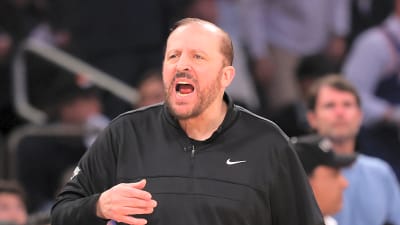
The New York Knicks' protest following their 105-103 loss to the Houston Rockets on Monday has thrust them into a potential historical moment in NBA history.
The controversial foul call against Knicks guard Jalen Brunson, acknowledged as incorrect by both the NBA's Last Two Minute Report and game crew chief Ed Malloy, prompted the Knicks to file a protest with the NBA in an attempt to dispute the loss, as reported by ESPN's Adrian Wojnarowski.
However, successful game protests are exceedingly rare occurrences in NBA history, with only six instances documented, and just once in the past 41 years. These protests often involve egregious officiating errors or rule misinterpretations that significantly impact the outcome of the game.
Dec. 19, 2007: Miami Heat vs. Atlanta Hawks
Nov. 30, 1982: Los Angeles Lakers vs. San Antonio Spurs
Nov. 8, 1978: New Jersey Nets vs. Philadelphia 76ers
Dec. 3, 1971: Cleveland Cavaliers vs. Buffalo Braves
Nov. 6, 1969: Atlanta Hawks vs. Chicago Bulls
Nov. 28, 1952: Milwaukee Hawks vs. Philadelphia Warriors
The last successful protest occurred during the 2007-08 season when the Miami Heat contested a game against the Atlanta Hawks after Shaquille O'Neal was erroneously called for his sixth foul. The protest revealed that O'Neal had only committed five fouls, leading to the resumption of the game months later, although O'Neal had already been traded to another team by that time.
For the Knicks, overturning the result of their game against the Rockets would not only mark a rare victory in the realm of NBA game protests but also provide a much-needed boost to their playoff aspirations. With seeding implications at stake, the Knicks are determined to rectify what they perceive as an unjust loss and potentially secure their place in an exclusive club of successful game protests.
Despite the odds stacked against them, the Knicks remain steadfast in their pursuit of justice, hoping to rewrite the narrative of Monday's game and pave the way for future teams facing similar circumstances.
As the league deliberates on the protest, the Knicks await the outcome with bated breath, knowing that their actions could potentially alter the course of NBA history and solidify their place among the league's most resilient and determined franchises.
NBA Referees Have To Get Better
NBA referees are under constant scrutiny, and criticisms about their performance have become increasingly vocal in recent years. Fans, players, coaches, and analysts alike have all weighed in on what they perceive as shortcomings in officiating, calling for improvements across various aspects of the game.
One of the primary concerns voiced by critics is the frequency of blown calls. In a fast-paced sport like basketball, where split-second decisions can determine the outcome of a game, any missed call can have significant consequences. Fans and players alike have expressed frustration with instances where referees appear to miss obvious fouls, traveling violations, or other infractions that impact the game's flow and fairness.
Furthermore, there's a growing sentiment that referees are too quick to whistle soft fouls, disrupting the rhythm of the game and leading to unnecessary stoppages. While player safety is paramount, some argue that referees should exercise more discretion in determining what constitutes a foul, allowing for a more physical style of play without compromising safety.
Critics also point to what they perceive as an over-reliance on technical fouls as a means of control. While maintaining order on the court is essential, there are concerns that referees are too quick to assess technical fouls for minor infractions or for players expressing frustration. This can stifle player emotion and spontaneity, detracting from the entertainment value of the game.
Moreover, there's a sense that referees are not consistently applying the rules, leading to confusion and frustration among players and fans alike. In particular, the criteria for ejecting players, especially superstars, seem arbitrary at times, with some high-profile ejections drawing widespread criticism for their perceived unfairness.
In conclusion, while NBA referees play a crucial role in maintaining the integrity and fairness of the game, there is widespread agreement that improvements are needed. From reducing the frequency of blown calls to exercising more discretion in calling fouls and technicals, there are several areas where referees can strive to get better. By addressing these concerns and striving for greater consistency and fairness, NBA referees can enhance the overall quality of the game and ensure a more enjoyable experience for players and fans alike.
More must-reads:
- Suns to hire Cavs assistant Jordan Ott as HC
- Ex-NBA champion head coach immediately linked to Knicks
- The 'NBA active leaders in made field goals' quiz
Breaking News
Trending News
Customize Your Newsletter
 +
+
Get the latest news and rumors, customized to your favorite sports and teams. Emailed daily. Always free!








